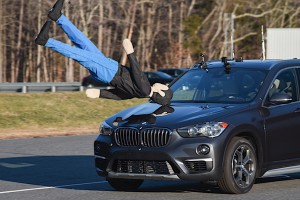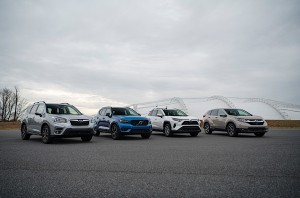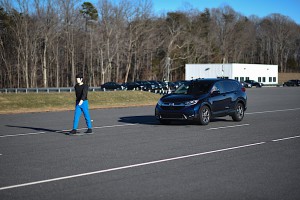Pedestrian fatalities have been on a rapid rise in recent years, something some experts blame on the shift to blunt-nosed utility vehicles. Whatever the reason, automakers are under pressure to find ways to reduce the problem.
The Insurance Institute for Highway Safety has launched a study to evaluate and compare the performance of new pedestrian crash avoidance technology and the first pass found wide disparity between the 11 small SUVs put to the test. The majority of the vehicles earned top ratings, but two performed poorly, the BMW X1 sending a crash dummy “airborne” when it failed to come to a stop.
“We want to encourage manufacturers to include pedestrian detection capabilities as they equip more of their vehicles with automatic emergency braking systems,” said David Aylor, the IIHS manager of Active Safety Testing. “We also want to arm consumers with information about these systems so they can make smart choices when shopping for a new vehicle.”
During the past decade, pedestrian fatalities have jumped by almost 50% – about 6,000 killed in 2017, the most recent year for which full data are available. The IIHS last year issued a report that suggested one of the reasons fatalities are on the rise is use of SUVs which tend to have taller, blunter front ends than sedans and coupes.
(IIHS unveils Top Safety Pick Plus models for 2019. Click Here for the story.)
Automakers have begun responding to the problem in a variety of ways. That includes passive technology, such as front ends designed to soften the impact. In Europe, where regulators have been more aggressive, some vehicles even use airbag-like systems that raise the hood slightly to absorb some impact forces when a pedestrian is tossed atop the vehicle.
In the U.S., the big focus has been on technology designed to detect when a pedestrian is in the vehicle’s path. Some systems sound a warning but others actually apply the brakes, if needed, to prevent an impact.
The Institute’s testing focuses on three common scenarios where such systems might be deployed:
- The first involves an adult on the right side of the road walking out into the vehicle’s path;
- Another involves an adult walking on the side of the road, their back to traffic;
- The third looks at how the systems respond when a child darts into the street from behind two parked vehicles, something Aylor called “every parent’s nightmare.”
“The best possible outcome is to avoid hitting a pedestrian altogether,” Aylor added. “When a crash is unavoidable, sharply reducing a vehicle’s travel speed would give someone on foot a far greater chance of surviving any injuries in a similar real-world encounter with a passenger vehicle.”
(Click Here to see how highway fatalities could again top 40k this year.)
Of the 11 small SUVs tested, only the Subaru Forester and Toyota RAV4 managed to avoid hitting the crash dummies in every perpendicular test. They were among four vehicles that managed to earn a “Superior” rating, along with the Honda CR-V and Volvo XC40.
Calling the new tests “unnerving to watch,” Jay Joseph, Honda assistant vice president for product planning, said they “highlight the need to consider the safety of all road users when designing advanced safety systems like those included in Honda Sensing,” its suite of advanced driver assistance systems.
Five other models earned an “Advanced” rating, the Chevrolet Equinox, Hyundai Kona, Kia Sportage, Mazda CX-5 and Nissan Rogue.
To earn that top two levels the vehicles had to either come to a complete without hitting a dummy or, at the least, slow down significantly before impact.
The Mitsubishi Outlander landed a “Basic” rating, while the BMW X1 got “No Credit” for its system which was by far the least effective of those tested.
(To see why IIHS says advanced driver assistance systems may cause, not prevent collisions, Click Here.)
The Bavarian model was one of five of the 11 vehicles tested that come standard with some of pedestrian detection technology, along with the Forester, the RAV4, the XC40 and the Rogue. All the others have the technology available as an option or as standard on only some grade levels.
IIHS 2019 Small SUV pedestrian crash prevention ratings
Superior
- 2018-19 Honda CR-V
- 2019 Subaru Forrester
- 2019 Toyota RAV4
- 2019 Volvo XC40
Advanced
- 2019 Chevrolet Equinox
- 2018-19 Hyundai Kona
- 2019 Kia Sportage
- 2018-19 Mazda CX-5
- 2019 Nissan Rogue
Basic
- 2019 Mitsubishi Outlander
No credit
- 2018-19 BMW X1



